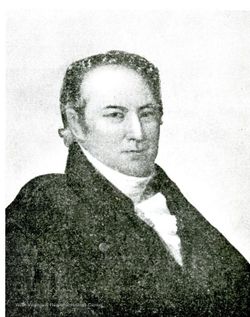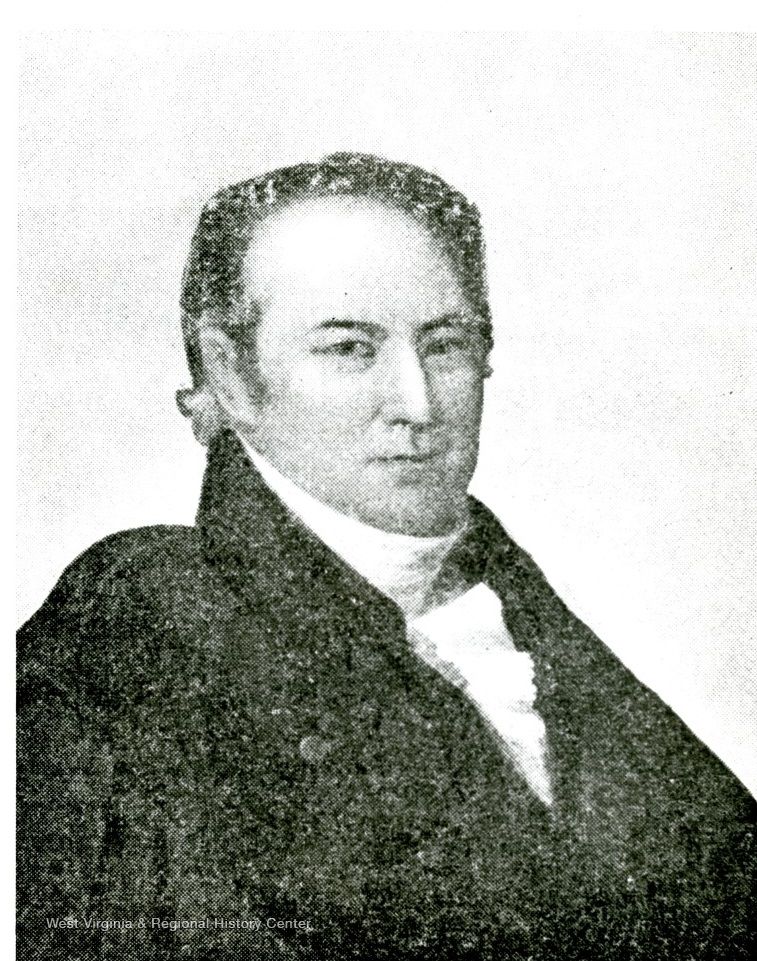Died August 27, 1843, at White Sulphur Springs, Greenbrier County, West Virginia. Buried in the Summers family cemetery at Walnut Grove Plantation, removed in 1978 to Spring Hill Cemetery, Charleston.
Judge Summers moved to Kanawah, Virginia (W.V.) when his father moved his family to Walnut Grove in 1811. He resided at Walnut Grove many years.
From History of Kanawha County by George W Atkinson (Charleston, 1876):
Judge Lewis Summers
Judge Summers was born in Fairfax county, Virginia, November 7, 1778, of a highly respectable parentage. He was one of the greatest men Virginia ever produced, when the two Virginias were one. He entered upon an active career, during the Presidency of the elder Adams, and from the outset took rank as a man of unusual foresight. With the ardor that distinguished the Virginia youth at the time Judge Summers made his deput in political life, he used his influence to achieve the civic victory which bore Thomas Jefferson into the Presidential office; and through a long and useful life he adhered to the political principles of his younger days with undeviating constancy.
In 1808, realizing the vastness of the resources of the western border, he removed to Gallipolis, Ohio, and began the practice of law, for which profession he had previously prepared himself by a thorough education. Shortly after his settlement at that point, he was elected to the State Senate, and served several terms with marked distinction. His usual common sense, and the deliberate judgment with which he had been so largely endowed by nature, fitted him for a law-maker and a leader. Such men are always sought after by the people to fill the important offices at their disposal. Judge Summers, although of an unassuming nature, was nearly always kept in office; oftentimes, however, against his will.
In 1814 he took up a permanent residence in this county. Bringing with him back to Virginia a large fund of legislative knowledge and experience, he had little more than become a citizen of the State, when his fellow-citizens called upon him to serve as representative in the legislature of Virginia, in the Assembly of 1817. In 1818 he was re-elected, and in February, 1819, he was chosen one of the Judges of the General Court, and a Judge of the Kanawha Judicial Circuit, which position he filled with great acceptability to all the people, as was evinced by their keeping him on the bench almost constantly thereafter. For a long time he was a member of the Board of Public Works of the State, in which position he did the entire county great service. He was very active in his efforts to carry through the James River and Kanawha Canal; and while it was generally pronounced a physical impossibility to construct a canal through the canyons of the Alleghany mountains, it is said that Judge Summers never faltered in his efforts to make the trial; at least, always claiming that nothing was impossible, and that it was only a matter of time for the construction of a canal and a railroad along the present line of the Chesapeake and Ohio railroad. He clearly saw the necessity for these great internal improvements, and always assured the people that they would some day be constructed. He was right. It was, as he said three-quarters of a century ago, only a matter of time; and now, where it was then considered almost impossible for the wild deer to wend his way through the great canyons of the New river Valley, the locomotive makes its thirty miles per hour, east and west, both day and night; along the same Valley a canal will be constructed before another generation passes from the stage of action.
In 1829 Judge Summers was elected a member of the Convention to revise the Constitution of Virginia. In that memorable assembly the sterling, vigorous, and practical character of the Judge's mind made him, before the close of its deliberations, one of the most useful members of that illustrious body. As the able champion of the true principles of elective government, he, in that assembly, performed services and acquired a reputation which will ever cause his memory to be cherished with warm and respectful affection by the people of the western portion of the State.
As a Judge, he was most able and faithful. As a lawyer, he had but few equals. As a statesman, his efforts were perseveringly directed to the best interests of his country. As a citizen, he was loved and respected by all who knew him. In all the different relations of his life, his own strong, original and vigorous mind has been indelibly impressed upon the times and events with which he was connected.
Judge Summers died at the White Sulphur Springs, in Greenbrier county, August 27, 1843, after having been for more than a quarter of a century one of the Judges of the General Court of Virignia. His remains were interred on the Summers' farm, at Walnut Grove, on the Kanawha river, a short distance below the mouth of Pocatalico river.
Died August 27, 1843, at White Sulphur Springs, Greenbrier County, West Virginia. Buried in the Summers family cemetery at Walnut Grove Plantation, removed in 1978 to Spring Hill Cemetery, Charleston.
Judge Summers moved to Kanawah, Virginia (W.V.) when his father moved his family to Walnut Grove in 1811. He resided at Walnut Grove many years.
From History of Kanawha County by George W Atkinson (Charleston, 1876):
Judge Lewis Summers
Judge Summers was born in Fairfax county, Virginia, November 7, 1778, of a highly respectable parentage. He was one of the greatest men Virginia ever produced, when the two Virginias were one. He entered upon an active career, during the Presidency of the elder Adams, and from the outset took rank as a man of unusual foresight. With the ardor that distinguished the Virginia youth at the time Judge Summers made his deput in political life, he used his influence to achieve the civic victory which bore Thomas Jefferson into the Presidential office; and through a long and useful life he adhered to the political principles of his younger days with undeviating constancy.
In 1808, realizing the vastness of the resources of the western border, he removed to Gallipolis, Ohio, and began the practice of law, for which profession he had previously prepared himself by a thorough education. Shortly after his settlement at that point, he was elected to the State Senate, and served several terms with marked distinction. His usual common sense, and the deliberate judgment with which he had been so largely endowed by nature, fitted him for a law-maker and a leader. Such men are always sought after by the people to fill the important offices at their disposal. Judge Summers, although of an unassuming nature, was nearly always kept in office; oftentimes, however, against his will.
In 1814 he took up a permanent residence in this county. Bringing with him back to Virginia a large fund of legislative knowledge and experience, he had little more than become a citizen of the State, when his fellow-citizens called upon him to serve as representative in the legislature of Virginia, in the Assembly of 1817. In 1818 he was re-elected, and in February, 1819, he was chosen one of the Judges of the General Court, and a Judge of the Kanawha Judicial Circuit, which position he filled with great acceptability to all the people, as was evinced by their keeping him on the bench almost constantly thereafter. For a long time he was a member of the Board of Public Works of the State, in which position he did the entire county great service. He was very active in his efforts to carry through the James River and Kanawha Canal; and while it was generally pronounced a physical impossibility to construct a canal through the canyons of the Alleghany mountains, it is said that Judge Summers never faltered in his efforts to make the trial; at least, always claiming that nothing was impossible, and that it was only a matter of time for the construction of a canal and a railroad along the present line of the Chesapeake and Ohio railroad. He clearly saw the necessity for these great internal improvements, and always assured the people that they would some day be constructed. He was right. It was, as he said three-quarters of a century ago, only a matter of time; and now, where it was then considered almost impossible for the wild deer to wend his way through the great canyons of the New river Valley, the locomotive makes its thirty miles per hour, east and west, both day and night; along the same Valley a canal will be constructed before another generation passes from the stage of action.
In 1829 Judge Summers was elected a member of the Convention to revise the Constitution of Virginia. In that memorable assembly the sterling, vigorous, and practical character of the Judge's mind made him, before the close of its deliberations, one of the most useful members of that illustrious body. As the able champion of the true principles of elective government, he, in that assembly, performed services and acquired a reputation which will ever cause his memory to be cherished with warm and respectful affection by the people of the western portion of the State.
As a Judge, he was most able and faithful. As a lawyer, he had but few equals. As a statesman, his efforts were perseveringly directed to the best interests of his country. As a citizen, he was loved and respected by all who knew him. In all the different relations of his life, his own strong, original and vigorous mind has been indelibly impressed upon the times and events with which he was connected.
Judge Summers died at the White Sulphur Springs, in Greenbrier county, August 27, 1843, after having been for more than a quarter of a century one of the Judges of the General Court of Virignia. His remains were interred on the Summers' farm, at Walnut Grove, on the Kanawha river, a short distance below the mouth of Pocatalico river.
Family Members
Advertisement
Explore more
Sponsored by Ancestry
Advertisement






